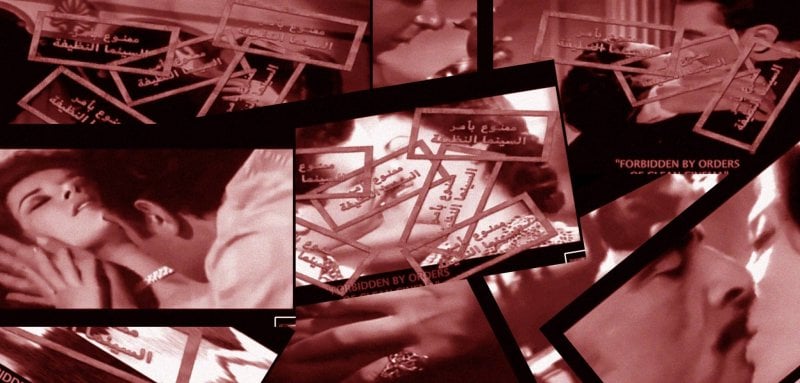"Would you wear a bikini on screen?" "Would you kiss a male co-star?" are questions often asked to almost every female actress in every media appearance in Egypt, but that hasn’t always been the case, and these questions reflect a wider phenomenon. In the early 90s a new term was introduced to the film industry and has become a staple in Egyptian society since then, that term is “clean cinema”. Clean cinema basically entails films that don’t include “hot scenes” and are suitable for families and Egyptian family values. And this notion of cleanliness or morality ascribed on films and art generally has persisted ever since.
The construction of that new brand of films happened due to a multitude of factors including recession in the cinema industry, basically marketing films to a wider audience i.e., families meant selling more tickets. And clean cinema was also being introduced during a period where Islamic entertainment was becoming more prominent through satellite channels like Iqraa and the rise of a new wave of Islamic preachers that aspired for a more modern brand. It also was happening after the repentant artists movement in the 80s where actors but mainly actresses quit acting, wore the veil, and even became preachers themselves against art. To this day almost 20 years later, clean cinema is still a debate amongst creatives and filmmakers. But if anything, clean cinema has put the responsibility of morality on actresses on screen and on women in Egyptian society at large, and altered the way intimacy is represented and practiced.
Sex or connotations of sex and sexuality persisted in Egypt's "Clean Cinema", it’s just that women were not active participants in the sexual act; they were portrayed as refusing/resisting since active engagement in intimacy meant they were easy or loose
Women’s bodies became the primary indicator as to whether a film is “clean” or not, they became a battleground for righteousness, and any representation of female desire became associated with immorality. However, sex or connotations of sex and sexuality still persisted, it’s just that women were not active participants in the sexual act; they were portrayed as refusing or resisting because active engagement in intimacy meant they were easy or loose. Filmmaker, and feminist activist Salma el Tarzi conducted research on the difference in dialogue in rape scenes and consensual sex scenes, and she found that the word “no” was repeatedly said by the female characters in both contexts essentially deriving it of its meaning and blurring the lines between consent and violence. She explains how this notion of the chase or women playing hard to get became normalized on screen and in reality. This idea of “the chase” portrays blatant sexual coercion in a romantic context, which not only normalizes sexual violence but also encourages women to engage and reproduce this cycle of helplessness and lack of sexual agency, or else she’s not a good woman.
In the above film, Omar and Salma 2, the main characters are newlyweds and still Omar convinces Salma who is shy and resistant to sleep with him, constructing a reality where even married women aren’t allowed to be enthusiastic about sex with their husbands, sex is now an exclusively male desire. And in general, clean cinema fetishized and weaponized women’s bodies as if they are inherently immoral, while allowing and embracing violence against women on screen, we’ve seen countless shots of women slapped on the face, violated, and abused.
In the above scene we see Ahmed Ezz or Reda the protagonist in Welad Rizk 2 slapping his wife and threatening to hit her mother, in a “comic” context. These types of scenes do not anger “clean cinema” advocates, while a mutual intimate kiss sure does. Thus, the only acceptable representation of women’s bodies became as raped, beaten, sexualized not as desiring or sexual.
A very interesting comment was made by film director Dawoud Abd El Sayed where he said in an interview that whenever he hires an actress, he asks her first if she would agree to wear a swimsuit, even if the film doesn’t actually have a swimsuit scene. He explained how if she refuses, he wouldn’t work with her because that means she doesn’t respect her craft. And while I agree that this sense of shame associated with being in the industry or with acting definitely affects artistic expression, I still think such stances do not take into account the actual material violence actresses are subjected to when they participate in “controversial” films, or even the violence women face on set whether by directors, acting coaches, or co-stars, and the realities of Egyptian women at large.
Egypt’s Clean Cinema did not just affect the film industry but it constituted a shift in cultural practices surrounding intimacy and female sexuality, normalizing violence and stripping women of their right to pleasure on and off screen
Clean Cinema did not just affect the film industry but it constituted a shift in cultural practices surrounding intimacy and female sexuality, normalizing violence and stripping women of their right to pleasure on and off screen. Reproducing a culture of shame by even having it become a normal interview question exclusive to actresses on nudity, bikinis, and intimacy, where the answer will be scrutinized no matter what.
Raseef22 is a not for profit entity. Our focus is on quality journalism. Every contribution to the NasRaseef membership goes directly towards journalism production. We stand independent, not accepting corporate sponsorships, sponsored content or political funding.
Support our mission to keep Raseef22 available to all readers by clicking here!
Interested in writing with us? Check our pitch process here!



